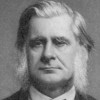The great and peculiar benefit which a fair course of scientific study confers, even on those who do not follow it as a profession, is that it compels such a firm and entire faith in our mental processes, so far as their range extends, that it teaches us what this range is, and enables us to distinguish between the natural and the artificial limitations of man’s powers. And let me bid you remember that this faith does not rest upon mere testimony, however respectable, however solemnly supported. The works of science are her witness. Her age of inspiration and of miracles is not over, but beginning, and its duration will be coeval with that of the intellect of man. Nor is access to her deepest secrets restricted to a race or to a priesthood. Every man can, if he pleases, apply to the sources of all scientific knowledge directly, and verify for himself the conclusions of others. In science, faith is based solely on the assent of the intellect; and the most complete submission to ascertained truth is wholly voluntary, because it is accompanied by perfect freedom, nay, by every encouragement, to test and try that truth to the uttermost.
T. H. Huxley (1825-1895) English biologist [Thomas Henry Huxley]
“Science and Religion,” lecture (Dec 1858)
(Source)
Quoted in The Government School of Mines, The Builder (Jan 1859)

